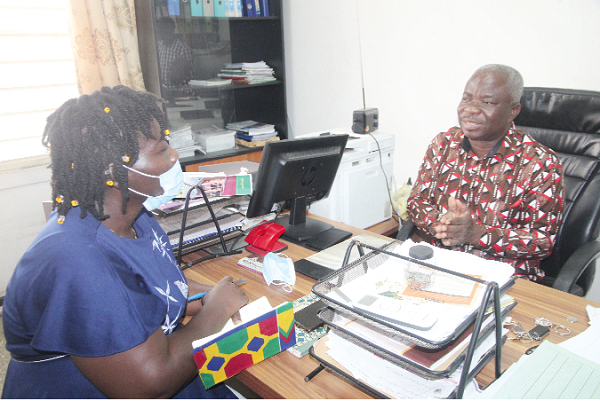
Legal Aid to beef up staff
The Legal Aid Commission (LAC) has started a process to recruit more lawyers and administrative workers to beef up its staff to provide an improved legal aid system in the country.
As part of the process, the commission has written to the Ministry of Finance to seek clearance for the recruitment.
The Executive Director of the LAC, Mr Martin Tieku Amoyaw, in an interview with the Daily Graphic in Accra on January 21, said the move was to make the presence and impact of the legal aid system stronger at the district level.
Over the years, only about half of the people who apply for the gratis legal service offered by the LAC are able to access it due to inadequate staffing at the commission.
It requires about 100 lawyers in the medium term to augment its operational staff to handle cases brought to it, a major challenge to the work of the LAC.
“From Bolgatanga to Accra, the lawyers we have are just 62. Greater Accra has the highest number of 11 lawyers, while the Ashanti Region has 10. For the rest of the regions, you can imagine,” he said.
Mr Amoyaw who began his terminal leave on January 23, said enhancing the human resource capacity of the commission would also help prevent wrongful incarceration of persons who, due to their inability to access legal representation, were languishing in jail.
“Before 2018 when we became a commission, we had only 20 district offices, but now we have 42, and by the close of this year, we will be adding 20 more offices. The plan is to establish at least eight offices yearly, so we will have all the districts covered,” he said.
He explained that since 2018, when the commission was carved out from the Office of the Attorney-General and Ministry of Justice to become independent, it had been working hard to deal with some of the challenges affecting its service delivery and expanding its operations to all districts in the country where the services were needed most.
He said the commission was working hard to fulfil its mandate of providing a better legal aid system that would ensure that poor and needy persons who found themselves in the grip of the law were provided with the needed legal representation to protect their rights.
Statistics
Providing some statistics to justify the urgent need for more lawyers, Mr Amoyaw indicated that in 2020, the commission received 9,133 cases under the Alternative Dispute Resolution (ADR) mechanism, out of which 5,535 were resolved, while 3,598 were pending.
For court cases, it received 2,456, out of which 1,115 were resolved, with 1,341 pending for the same year, he said.
As of September last year, he said, ADR cases received were 5,392, out of which 3,904 were resolved, leaving 1,488 pending, while the court cases received were 1,658, out of which 734 were resolved, with 924 pending.
He noted that the expansion to the districts and constant presence on the airwaves to educate the public on their right to justice had created awareness and triggered demand for the services.
Some of the cases pending, he noted, were as a result of delays in court processes or among parties.
He expressed the hope that when the process to recruit more lawyers was completed, the prevalence of legal aid would be felt and “the many people who go to prison because they have nobody to defend them will reduce. It will also help in the decongestion of the prisons”.
Importance
Mr Amoyaw stressed the relevance of the commission in the justice delivery system, saying it offered free legal support to the poor to decongest the prisons by saving innocent people from being incarcerated wrongly because they could not afford legal services.
“Our job is very important and we have to be in every district to see to the welfare of the people in terms of justice. Basically, the poor people who we serve are in the districts and mostly involved in petty crimes for which they are sentenced to three or five years for stealing cassava. They need representation, so that their rights are not abused,” he said.
Transportation, decent offices
The commission was also not well resourced in terms of the facilitation of movement, as the two vehicles it had were a challenge for its lawyers, he said.
“We don’t have any vehicle in any of the offices in the country, except the two in the Accra office,” Mr Amoyaw said.
“Another issue is about our office space. Legal Aid has no decent office space nationwide and it is a problem. In Accra, we are occupying the basement of the Council for Law Reporting.
“Two rooms have been allocated to about 11 lawyers who have to receive clients at different points in time daily, leading to a lack of confidentiality, which is a key ingredient of their work,” the executive director said.
He said lawyers who would be recruited would need decent offices to work in and, therefore, appealed to the government to complete the Law House Complex this year, as promised, to enable Legal Aid to have its permanent offices.
Financial issue
Although Mr Amoyaw said the finances of the LAC had improved since it became a commission, it still needed more resources and logistics to support its work.
He commended the government for its support in terms of providing funds and office equipment which had improved their services to the citizenry.
To become financially independent, as required by the Legal Aid Commission Act, 2018 (Act 977), the commission would this year set up a financial committee which would help raise funds to carry out its activities, he said.
